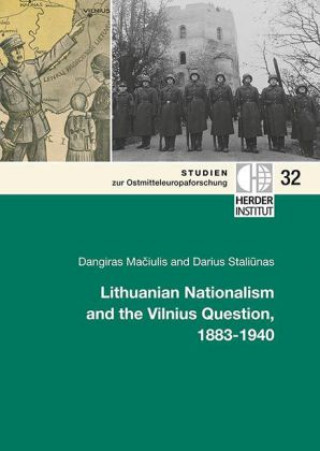
Kod: 09507887
Lithuanian Nationalism and the Vilnius Question, 1883-1940
Autor Dangiras Maciulis, Darius Staliunas
According to the 1897 general census of the Russian Empire, the percentage of Lithuanians in the city of Vilnius stood only at 2.1 per cent. At the same time, Lithuanian activists also had no allies in their struggle for the creat ... więcej
- Język:
 Angielski
Angielski - Oprawa: Miękka
- Liczba stron: 236
Wydawca: Verlag Herder-Institut, 2015
- Więcej informacji o książce

196.33 zł
Zwykle: 206.59 zł
Oszczędzasz 10.26 zł

Na zamówienie
Wysyłamy za 3 - 5 dni
Zobacz książki o podobnej tematyce
-

75-Day
85.57 zł -5 % -

MARKET LEADER PRE-INTERMEDIATE BUSINESS ENGLISH COURSE BOOK+CD
215.36 zł -3 % -

Ornamental Horticulture
601.09 zł -

Code of Federal Regulations, Title 12: Parts 1-199 (Banks and Banking) Comptroller of the Currency: Revised 1/09
233.98 zł -

Put the Billy On
85.77 zł -1 % -

CT33 3-17 Moving In-Service Pipeline Trainee Guide
122.02 zł -

Literary Varieties
135.42 zł -5 %
Podaruj tę książkę jeszcze dziś
- Zamów książkę i wybierz "Wyślij jako prezent".
- Natychmiast wyślemy Ci bon podarunkowy, który możesz przekazać adresatowi prezentu.
- Książka zostanie wysłana do adresata, a Ty o nic nie musisz się martwić.
Więcej informacji o Lithuanian Nationalism and the Vilnius Question, 1883-1940
Za ten zakup dostaniesz 114 punkty
 Opis
Opis
According to the 1897 general census of the Russian Empire, the percentage of Lithuanians in the city of Vilnius stood only at 2.1 per cent. At the same time, Lithuanian activists also had no allies in their struggle for the creation both of territorial autonomy first and later of an independent state "within its ethnographic boundaries" with Vilnius as its capital. Yet, irrespective of all these circumstances, the majority of the leaders of the Lithuanian national movement saw Vilnius as their future capital. This book explores the emergence of the notion of Vilnius as the capital of modern Lithuania, which was nurtured in the late 19th and early of the 20th century, as well as examining its evolution and implementation among the masses. Since the nationalists of the time found it hard to imagine a national state with a capital in which the titular nation makes up no more than a few percent of its citizens, Lithuanisation of Vilnius, i.e. the aim that the majority of the city's inhabitants be Lithuanians, is also among the topics discussed in this study. A great part of the book is devoted to the interwar period when Vilnius was part of Poland, and the Lithuanian political and intellectual elite tried to instill the idea of Vilnius as an eternal capital of Lithuania into the masses. This study shows that in interwar Lithuania, the idea of Vilnius as the capital of modern Lithuania became not only a political ideal but also a tool for political manipulation. While this book does not analyse in detail the attitudes held by Jews, Poles, Belarusians or Russians regarding the Vilnius question, it nevertheless points out the counter-arguments of other Nationalities the Lithuanian claims to Vilnius were up against.§§Der 1897 im Russischen Reich durchgeführte Zensus bezifferte den litauischen Anteil der Bevölkerung von Vilnius auf lediglich 2,1 Prozent. Gleichzeitig verfügte die litauische Nationalbewegung über keinerlei Verbündete in ihrem Kampf, der zunächst auf die Herstellung territorialer Autonomie, später dann auf die Errichtung eines unabhängigen Staates "in seinen ethnographischen Grenzen" mit Vilnius als Hauptstadt abzielte. Trotz dieser ungünstigen Umstände sahen ihre zentralen Akteure Vilnius als zukünftige litauische Hauptstadt an. Das vorliegende Buch untersucht das Zustandekommen dieses Ansinnens, das im späten 19. und frühen 20. Jahrhundert aufkam, und fragt nach seiner Entwicklung und Implementierung. Da für die Nationalbewegung eine Hauptstadt schwer vorstellbar war, in der die Titularnation lediglich wenige Prozent ihrer Bevölkerung ausmachte, liegt ein weiterer Fokus der Studie auf die für nötig erachtete Litauinisierung Vilnius'. Ein großer Teil des Buches befasst sich mit der Zwischenkriegszeit, in der Vilnius zu Polen gehörte, und in der die litauische politische und kulturelle Elite Anstrengungen unternahm, die Idee von Vilnius als ewiger Hauptstadt Litauens in die breite Bevölkerung zu tragen. In dieser Periode, so ein Ergebnis der Studie, wurde Vilnius nicht nur zu einer politischen Idee, sondern entwickelte sich gleichzeitig zu einem Werkzeug politischer Manipulation. Auch die Ansprüche anderer Nationalitäten, die beispielsweise von Juden, Polen und (Weiß-)Russen vorgebracht wurden und denen sich die litauische Nationalbewegung gegenübersah, werden skizziert.
 Szczegóły książki
Szczegóły książki
196.33 zł
- Pełny tytuł: Lithuanian Nationalism and the Vilnius Question, 1883-1940
- Autor: Dangiras Maciulis, Darius Staliunas
- Język:
 Angielski
Angielski - Oprawa: Miękka
- Liczba stron: 236
- EAN: 9783879694013
- ID: 09507887
- Wydawca: Verlag Herder-Institut
- Waga: 418 g
- Wymiary: 240 × 170 × 14 mm
- Rok wydania: 2015
Ulubione w innej kategorii
-

Dune
34.83 zł -33 % -

Haunting Adeline
125.75 zł -1 % -

Berserk Deluxe Volume 2
212.54 zł -1 % -

White Nights
15.29 zł -23 % -

Powerless
48.72 zł -11 % -

Atomic Habits
59.19 zł -26 % -

Dune Messiah
46.31 zł -3 % -

Berserk Deluxe Volume 3
218.08 zł -3 % -

One Day
32.61 zł -36 % -

Berserk Deluxe Volume 1
211.73 zł -2 % -

Iron Flame
61.11 zł -28 % -

Surrounded by Idiots
36.74 zł -28 % -

Harry Potter and the Prisoner of Azkaban (Minalima Edition)
170.35 zł -2 % -

Gravity Falls Journal 3
89.40 zł -

Heaven Official's Blessing: Tian Guan Ci Fu (Novel) Vol. 1
85.57 zł -5 % -

The Creative Act
100.17 zł -15 % -

Dune
47.31 zł -23 % -

Hunting Adeline
126.45 zł -4 % -

A Little Life
47.01 zł -14 % -

Children of Dune
46.71 zł -2 % -

Heaven Official's Blessing: Tian Guan Ci Fu (Novel) Vol. 2
77.72 zł -14 % -

Bungo Stray Dogs, Vol. 8 (light novel)
65.74 zł -4 % -

Percy Jackson and the Olympians 5 Book Paperback Boxed Set
185.45 zł -4 % -

Solo Leveling, Vol. 1
86.68 zł -3 % -

The Prisoner's Throne
44.90 zł -12 % -

Court of Thorns and Roses
43.39 zł -15 % -

Cry Baby Coloring Book
47.31 zł -1 % -

Fourth Wing
73.89 zł -12 % -

Icebreaker
35.13 zł -26 % -

Berserk Deluxe Volume 6
218.08 zł -3 % -

Avatar, the Last Airbender: The Kyoshi Novels (Box Set)
169.14 zł -2 % -

The 48 Laws of Power
100.88 zł -12 % -

House of Leaves
124.04 zł -3 % -

Twisted Lies
37.75 zł -26 % -

Dune Messiah
49.63 zł -13 % -

No Longer Human
58.49 zł -5 % -

48 Laws Of Power
61.11 zł -28 % -

Twisted Games
37.75 zł -26 % -

Caraval Paperback Boxed Set
175.49 zł -3 % -

Solo Leveling, Vol. 2
80.34 zł -17 % -

Open Circuits
169.55 zł -2 % -

Berserk Deluxe Volume 5
156.46 zł -30 % -

Heaven Official's Blessing: Tian Guan Ci Fu (Novel) Vol. 3
79.43 zł -12 % -

Berserk Deluxe Volume 4
201.26 zł -11 % -

Court of Mist and Fury
36.54 zł -26 % -

SOLO LEVELING V08
88.39 zł -2 % -

English File Upper Intermediate Multipack A (4th)
100.57 zł -

CHAINSAW MAN V14
43.59 zł -21 % -

Before the Coffee Gets Cold
33.92 zł -26 %
zadowolonych klientów
Od roku 2008 obsłużyliśmy wielu miłośników książek, ale dla nas każdy był tym wyjątkowym.
Copyright! ©2008-24 libristo.pl Wszelkie prawa zastrzeżonePrywatnieCookies


 21 milionów książek
21 milionów książek Dostawa 10.99 zł
Dostawa 10.99 zł (32) 444 93 66 (8-15.30h)
(32) 444 93 66 (8-15.30h)